Antimicrobial Stewardship Program
Rapid Diagnostics and Antimicrobial Stewardship
By supplying healthcare providers with a comprehensive set of diagnostic information, Alere empowers a shift in prescribing behavior away from the over-use of antibiotics, which spawned the growing prevalence of serious healthcare-associated infections like Methicillin-resistant Staphylococcus aureus (MRSA)- and Clostridium difficile-associated disease.
Alere offers a best-in-class rapid diagnostic portfolio, which enables healthcare practitioners to distinguish between respiratory tract infections that require treatment and those that are self-limiting, as well as several other diagnostic tools that can help clinicians identify pathogens at the point of care and define an appropriate treatment strategy earlier. These include solutions for Shiga toxin, Giardia, Cryptosporidium, S. pneumoniae, Methicillin-resistant Staphylococcus aureus (MRSA) and Clostridium difficile.
Diseases

Streptococcus pneumoniae
Community-acquired pneumonia (CAP) is a common disease that is associated with considerable mortality and morbidity, and accounts for high antibiotic consumption.
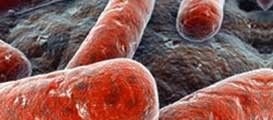
Legionella pneumophila
Since the original description of Legionnaires' disease in 1977, Legionella pneumophila has been increasingly recognized as a cause of sporadic and epidemic CAP in all age groups.
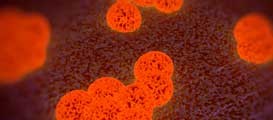
Methicillin-resistant Staphylococcus aureus
Worldwide, it is estimated that between 2 million and 53 million people carry Methicillin-resistant Staphylococcus aureus (MRSA) and rates are increasing rapidly.

Clostridium difficile
Clostridium difficile is the most common cause of Healthcare Associated Diarrhea in industrialized countries. In North America, C. difficile is present in 13 of every 1,000 hospital inpatients and the estimated annual economic burden is approximately $3.2 billion.
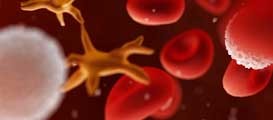
Leukocytes
Gastrointestinal diseases often share similar symptoms, which can pose difficulties pinpointing the cause of disease. Physicians will often use the presence of intestinal inflammation as a clue to the possible cause and treatment of symptoms.

Escherichia coli
Vero-cytotoxin/Shiga Toxin-producing Escherichia coli are a significant threat to public health causing food-borne and water-borne diarrhea disease and mortality worldwide.
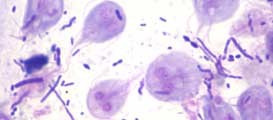
Giardia and Cryptosporidium
Giardia and Cryptosporidium account for nearly all waterborne intestinal parasitic infections in the U.S. Person-to-person transmission is facilitated by recreational water supplies, including swimming pools.
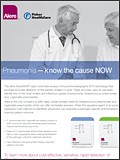
Rapid urine tests employ immunochromatographic technology that provides accurate detection of the specific antigen in urine.
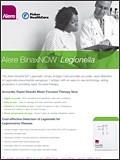
The Alere BinaxNOW Legionella Urinary Antigen Card provides accurate, rapid detection of Legionella pneumophila serogroup 1 antigen.
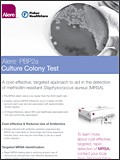
A cost-effective, targeted approach to aid in the detection of methicillin-resistant Staphylococcus aureus (MRSA).
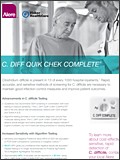
Rapid, accurate, and sensitive methods of screening for C. difficile is necessary to maintain good infection control measures and improve patient outcomes.
More Resources
Shiga Toxin Quik Chek
Detect VTEC/STEC toxins direct from fecal samples with the new Shiga Toxin Quik Chek test.
Leuko EZ Vue
Detect elevated levels of fecal lactoferrin, a marker of fecal leukocytes and an indicator of intestinal inflammation.
Giardia/Cryptosporidium Quik Chek
This new test improves upon traditional testing methods by eliminating complicated, labor-intensive processes.
